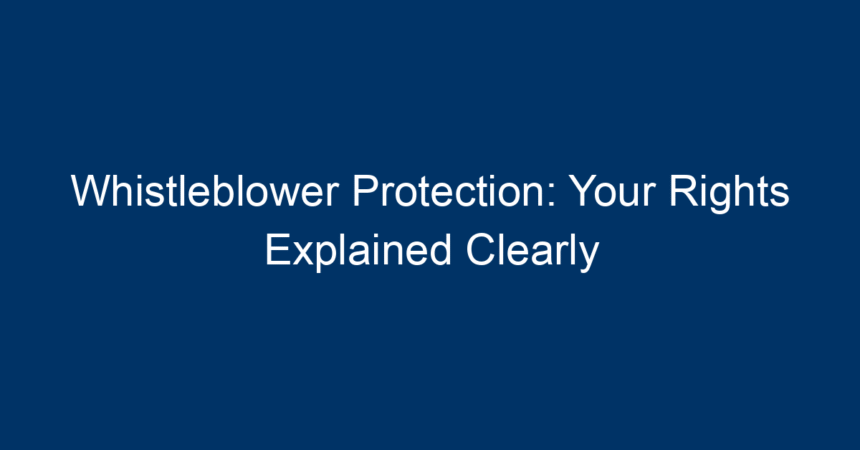Whistleblowing is a courageous act, often involving individuals exposing wrongdoing within organizations. However, stepping into this realm isn’t without risks. Thankfully, whistleblower protection laws exist to safeguard individuals from retaliation and provide a safe environment for reporting misconduct. In this article, we will explore your rights under whistleblower protection laws, the processes involved, and vital information every potential whistleblower should know.
What is Whistleblower Protection?
Whistleblower protection refers to the legal safeguards established to protect individuals who report illicit activities, fraud, or violations within an organization. These laws prevent retaliation against whistleblowers, ensuring that they can report issues without fear of losing their job or facing other forms of discrimination.
Why is Whistleblower Protection Important?
Often, whistleblowers are the first line of defense against corruption and injustice. By exposing wrongdoing, they help to restore integrity, compliance, and ethical standards within organizations. Ensuring that whistleblowers feel safe and protected promotes a culture of transparency that benefits everyone.
Understanding Your Rights as a Whistleblower
It’s crucial to understand the rights afforded to you as a whistleblower. Here’s a breakdown:
Federal Protections
In the United States, several federal laws provide whistleblower protection. Key statutes include:
- Whistleblower Protection Act (WPA): This act protects federal employees who disclose information they reasonably believe demonstrates a violation of law, gross mismanagement, or dangers to public health.
- Occupational Safety and Health Administration (OSHA): OSHA provides protections for employees in various industries, especially when reporting unsafe working conditions.
- Health Insurance Portability and Accountability Act (HIPAA): Under HIPAA, healthcare employees who report violations regarding patient confidentiality and security are shielded from retaliation.
State Protections
Many states have their own whistleblower protection laws, which can be more comprehensive than federal laws. Each state may vary in terms of coverage and specific protections, so it’s crucial to understand local legislation to ensure your rights are upheld.
Protections in the Private Sector
Private-sector employees may also enjoy specific protections under federal laws, such as the Sarbanes-Oxley Act, which protects employees of publicly traded companies who report fraud or violations of securities law.
The Importance of Reporting Medios Correctly
The method of reporting is essential for maintaining your whistleblower protection. Generally, the following steps should be observed:
1. Internal Reporting
Many organizations have internal processes for reporting misconduct. If you feel safe, report the wrongdoing to a supervisor or designated compliance officer first. This action demonstrates good faith and may provide resolution without outside intervention.
2. External Reporting
If internal reporting does not yield results or if you fear retaliation, consider reporting to an external authority. This could be a government agency, regulatory body, or even the media in severe cases. Always document your reporting methods and outcomes, as preserved evidence may be crucial for protecting your rights.
Potential Retaliation and How to Combat It
Despite protective legislation, retaliation against whistleblowers can still occur. Understanding the forms of retaliation and knowing how to respond is essential for your safety and peace of mind.
Common Forms of Retaliation
- Termination: Losing your job is the most severe form of retaliation.
- Demotion: Lowering your position or responsibilities can undermine your career.
- Disciplinary Action: This might include unwarranted warnings or disciplinary measures.
- Isolation: Colleagues may distance themselves, impacting your working environment.
Steps to Take if You Experience Retaliation
-
Document Everything: Keep a record of all incidents, including dates, times, and witnesses. This information can support your case if you decide to take legal action.
-
Consult Legal Counsel: Engaging with a lawyer who specializes in whistleblower cases can provide guidance tailored to your situation. They can help you understand your rights and the best course of action.
- File a Complaint: If you experience retaliation, you can file a complaint with the relevant government agency or pursue an internal grievance through your organization’s established protocols.
Cultivating a Whistleblower-Friendly Environment
Organizations also have a critical role in fostering a safe and supportive environment for potential whistleblowers. Here are some practices to consider:
1. Create Clear Policies
Establish clear anti-retaliation policies that outline acceptable behavior and define reporting procedures. Employees should feel secure in knowing they can report misconduct without fear.
2. Promote Transparency
Encouraging open dialogue about ethical behavior reinforces a culture of accountability. Regular training and awareness programs can help employees understand the importance of whistleblower protections.
3. Ensure Confidentiality
Protecting the identity of whistleblowers is paramount. Organizations should have systems in place to ensure reports can be made anonymously or confidentially.
Frequently Asked Questions (FAQs)
What should I do if I suspect illegal activity in my workplace?
Start by familiarizing yourself with your organization’s policies on whistleblowing. If you feel safe, report your concerns internally; otherwise, consider reaching out to an external body.
How can I ensure my report stays confidential?
Use anonymous reporting channels if available. Familiarize yourself with your company’s policies on confidentiality before making a report.
Can I lose my job for blowing the whistle?
While whistleblower protection laws are designed to protect you, there’s still a risk of retaliation. Familiarize yourself with your rights and consider seeking legal advice if you’re concerned.
Conclusion: Taking Action
Whistleblower protection laws exist to support individuals willing to expose wrongdoing. Understanding your rights is crucial for ensuring you can report misconduct without fear. Always prioritize safety and seek guidance from legal professionals if needed.
If you feel compelled to speak up, remember that informed individuals are empowered whistleblowers. By understanding your protections and the processes involved, you can contribute to a culture of accountability and integrity within your organization.
Take the first step—your voice can promote change and make a significant difference.




